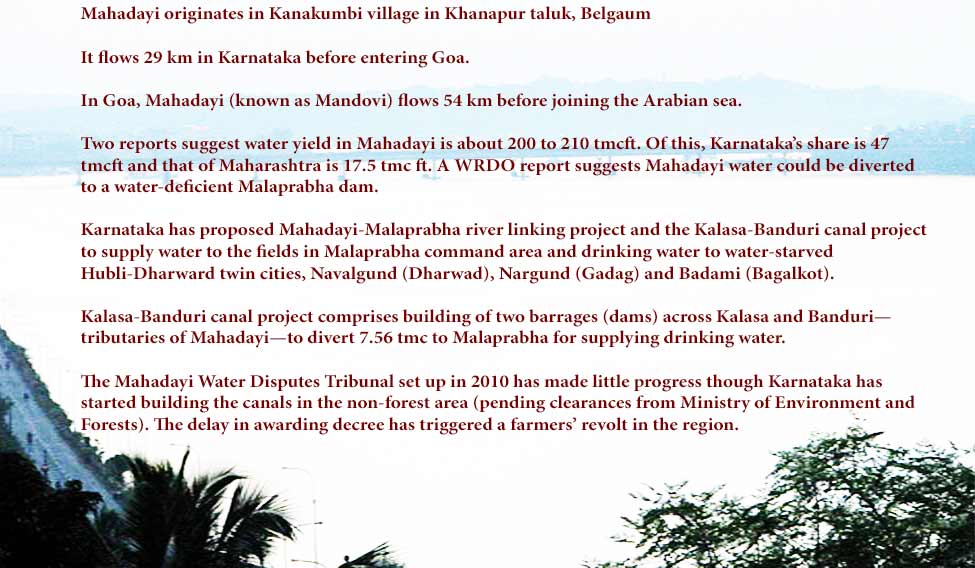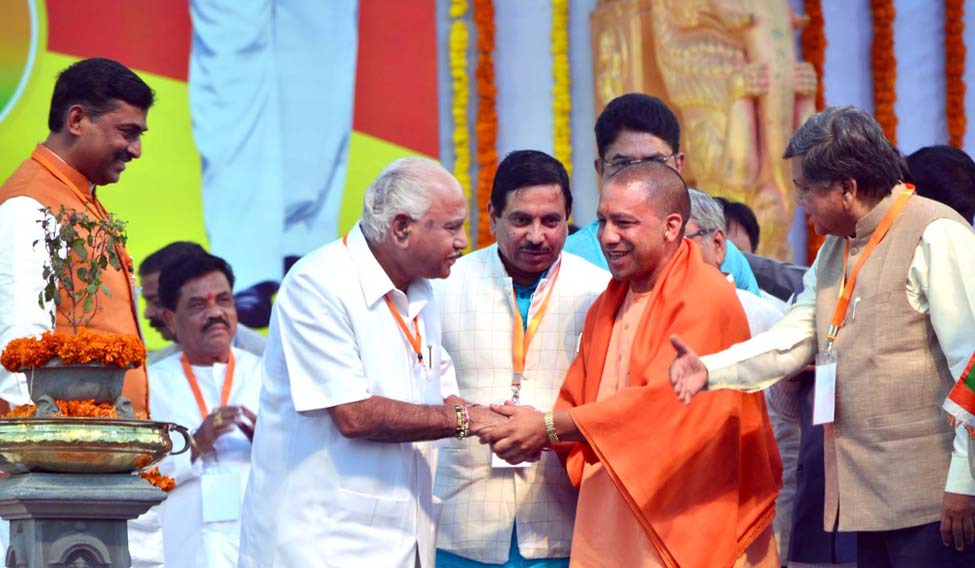To rejoice or not to rejoice, is the question before the hundreds of farmers in rebellion in the north Karnataka districts, who had gathered at Hubli's Nehru Maidan to hear the “good news” promised by the BJP.
The farmers have been on an agitation for the last two years, demanding implementation of Kalasa-Banduri project that can quench the thirst of at least three districts – Gadag, Belagavi and Dharwad. But the project is stuck due to the 30-year-old inter-state water dispute over sharing of Mahadayi river water among the three riparian states of Goa, Maharashtra and Karnataka. The Mahadayi agitation is sure giving jitters to both the parties in an election year, as farmers allege that both are indulging in political rhetoric and blamegame. The region with its 50 crucial seats spread across six districts has been a deciding factor in swinging the elections.
On Thursday, BJP state president B.S. Yeddyurappa read out a letter from Goa Chief Minister Manohar Parikkar, where he had assured that the Goa government would “not oppose” the “reasonable and justified” quantum of water meant for drinking needs of the people of north Karnataka. He had also reiterated that a bilateral discussion, as suggested by the Tribunal, was needed. And that Goa understands that access to drinking water is a basic human need, and on “humanitarian ground”, his government was willing to consider the request to work out an amicable settlement strictly restricted to drinking water in the drought prone areas.
Ironically, the latest assurance by Goa is nothing significant as the earlier negotiations have failed as Goa is hopeful of getting a favourable verdict before August 2018, when the extended term of the Tribunal ends. The Karnataka farmers have been demanding out-of-court resolution of the Mahadayi dispute, alleging the proceedings of the Tribunal (constituted in 2010) are painfully slow.
The Congress government in Karnataka has been shying away from negotiations as the party has been backing Goa since May 2007, when Congress president Sonia Gandhi, while addressing an election rally at Margao, assured Goans that her party would not allow diversion of the Mahadayi waters. Chief Minister Siddaramaiah, who led an all-party delegation in 2015, has been insisting on Prime Minister Narendra Modi's intervention to end the deadlock.
On the other hand, the BJP, which has been rattled by the Lingayat movement that threatens to divide their traditional votebank in the region, is now facing the heat for neglecting the Mahadayi issue. That explains why BJP state president B.S. Yeddyurappa, who is leading the 75-day 'Parivartana Yatre' (rally for transformation), which was passing through the epicentre of the Mahadayi agitation, took an usual break on December 20. Yeddyurappa flew to Delhi for an emergency meeting with Goa Chief Minister Manohar Parikkar, which was mediated by BJP national president Amit Shah.
Soon after Yeddyurappa petitioned Parikkar, Vinod Palyekar, Goa water resources minister and MLA from Goa Forward Party, an ally of the BJP-led coalition government, tweeted saying his party and the water resource department remained unchanged on Mhadei (Mahadayi).
Our @Goaforwardparty & my WRD depts stand remains unchanged on #Mhadei. We are committed to protect our mother #Mhadei & protect each drop of water . We are committed to protect Goem Goem Goemkarponn to take #GoaForward.
— Vinod Palyekar (@vinod_palyekar) December 21, 2017
Parikkar too clarified that Karnataka BJP leaders had submitted a petition seeking release of Mahadayi for drinking water purpose. “I listened to them and told them that our response will be sent in writing. No formula discussed or given,” Parrikar said.
It will be a tough call for the Goa chief minister to yield to the demands of his party MPs from Karnataka, as the BJP in Goa, which bagged only 13 seats in last Assembly polls in March, is leading a coalition government. The BJP will have to convince its allies—Goa Forward Party (GFP), Maharastrawadi Gomantak Party (MGP) and two Independents, which seems most unlikely. The real question before the two states is whether Goa can afford to let diversion of 7.56 tmc of water to quench the thirst of the people of north Karnataka, through negotiations or by Tribunal order considering that the lower riparian state is opposed to diversion citing ecological problems.
Irked by Yeddyurappa's initiative, Sidadramaiah has dubbed it as an election gimmick and also hit back at Parikkar for writing to Yeddyurapa. “As the Goa chief minister, Parikkar should have written to the Karnataka chief minister. This is only an election gimmick. Why did the BJP wake up only now, just before the elections?,” he asked.
JD(S) state president H.D. Kumaraswamy warned the BJP against misleading the people stating the letter conveyed nothing new.
The dispute over sharing of the water of the Mahadayi river between the states of Maharashtra, Karnataka and Goa started way back in 1980s, when Malaprabha dam failed to yield enough water to irrigate the fields in its command area. Aaccording to a report by the Water Resources Development Organisation (WRDO), there was a deficit of 17 tmc (against an estimated maximum yield of 45 tmc) in the dam and the drought-prone regions (tail-end villages in the Malaprabha basin) could benefit by diverting water from Mahadayi river.
The issue reached a flashpoint in 2002, when the Karnataka government during S.M. Krishna's tenure as chief minister, decided to implement drinking water project by building a canal across two tributaries of the Mahadayi—Kalasa and Banduri, that aimed at diverting 7.56 TMC of water from Mahadayi to Malaprabha river to cater to the drinking water needs of three parched districts of Belagavi, Dharwad and Gadag. In April 2002, the NDA government gave approval in principle but stayed the project in September after Goa, the lower riparian state and green brigade opposed the project citing ecological hazard. The Parrikar government argued that the Kalasa Banduri project would cause immense ecological damage in Goa since the river supports the fragile eco system in parts of the Western Ghats located in the territory of Goa.
While, some experts believe change in cropping pattern in the water-scarce Malaprabha basin could help, Goa seeks to know why Karnataka cannot harness the Krishna waters for drinking water instead of tapping Mahadayi. Goa approached the Centre the same year with a request to set up Mahadayi Water Dispute Tribunal, to assess the “available utilisable water resources” in the basin at various points and allocation of this water to the three basin states keeping in view priority of the use of water”. Goa then approached the Supreme Court, too, seeking a tribunal.
In 2006, the then JDS-BJP coalition government in Karnataka brought the dispute to the fore once again with Chief Minister H.D. Kumaraswamy deciding to revive building two canals (at a cost of Rs 400 crore) connecting the Kalasa and Banduri tributaries of Mahadayi to Malaprabha basin to supply drinking water to twin cities.
With no prospects of a negotiated agreement in sight between the three states, the UPA government eventually set up the Mahadayi Water Disputes Tribunal on November 16, 2010. The canal work along Kalasa- Banduri (in non forest areas pending clearance from the Ministry of Environment and Forests) was stalled and the government was forced to give an undertaking which barred automatic flow of water into the canals till the Tribunal gave its decree.
The Mahadayi agitation threatens to upset the electoral prospects of both the national parties, as the consecutive drought years, and the lack of political will of subsequent government has angered the people of north Karnataka.







